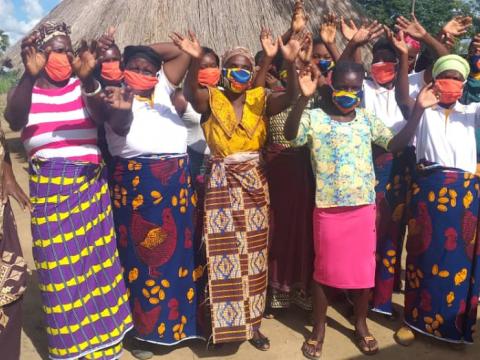Rural women’s group stepping up to prevent the spread of COVID-19


Disrupting lives and destroying economies
COVID-19 is a disease like no other. The effect of the coronavirus, the virus that causes COVID-19, on the loss of lives and the negative impact it is creating on the economies of both developed and undeveloped countries is unprecedented.
According to the United Nations labour body, the COVID-19 pandemic is not only suppressing economic growth but is also expected to wipe out 195 million jobs worldwide.
For developing countries like Zambia, which has so far more than 50 COVID-19 cases, with a population of over 18 million, the coronavirus has put millions of people in the informal sector in quandary due to restriction of movement and the closure of businesses.

Community actions to help sponsors conquer the disease:
While nations are frantically researching to develop a vaccine in the hope of restoring things back to normal and conquering the disease, the promotion of preventive measures to stop and slow the spread of the disease has become the key focus in Zambia, which has seen two people die from the increasing number of cases being recorded.
The epicenter of COVID-19 in Zambia is the capital city of Lusaka. About 165 kilometres from there, lies Choongo, a rural settlement where World Vision operates under the Choongo Magoye Area programme.
It is here where you will find Mano Mabulanwa women’s group. The community-led group was established in 2016 with the purpose of helping retrieve girls from child marriages.
Mano Mabulanwa loosely means “Knowledge is Shared” in English. The group, made up of 15 women, is led by Patricia Mandubeko, aged 68.
“With the support from World Vision, the group helps to counsel girls retrieved from child marriages, teaches life skills to school dropouts due to teen pregnancies and women affected by various forms of gender violence,” Patricia says.
When the coronavirus was first reported in Asia, the group embarked on making handmade masks from chitenge materials for child sponsors from Korea.
“When we heard about the disease, our first response was what can we do to help the sponsors from Korea who support our community?” Patricia says. “We knew that we could never give back in an exact measure what our sponsors have given to change our lives in our communities, so the least we could do was use our hands and give them hope by making face masks to help prevent them from contracting the coronavirus.”
So the women’s group embarked on making 56 face masks that were sent to the Choongo Magoye AP to be delivered to World Vision sponsors in Korea.
The act of the women to use what is within their reach and make gifts to those affected in Korea delighted the children who are being helped by the sponsors.
“I heard that the coronavirus is killing people. I feel nice that my mother made the mask for my sponsors so they can be safe where they are,” says Pretty, a grade 7 pupil at a local school.

World Vision Church, Community Engagement and Sponsorship Planning Project Development Facilitator Florence Mulenga says that the organisation is helping communities in Choongo and Magoye respond to COVID-19 by sensitizing communities on preventative measures to stop the spread of the coronavirus, focusing on households and communities.
“We are working with groups like Mano Mabulanwa to reach out to communities to teach them about preventative behaviours such as hand washing,” she says.

“World Vision in the district is also working in collaboration with the Ministry of Health, local government and the Young Journalist clubs in sensitizing the community on COVID-19. So far 24 staffs in five Health Centres within the area programme have been trained in Infection Prevention and Control (IPC) of COVID whereas 12 Neighborhood Health Committee (NHC) members from six committees have trained respectively,” Florence adds.
Stepping up

With more than 50 COVID-19 confirmed cases in Zambia, the group is looking at starting to make masks for the communities in Choongo and Magoye and other surrounding areas to help prevent the spread of the disease.
“I am really worried about the disease coming to our community,” Patricia says. “My wish with my members is that we start making more face masks for sale to help people in the community who cannot afford to buy surgical masks which are expensive.”
Her fear is valid, according to a UN body briefing report 2020, “In Africa, an outbreak of the virus is of extreme concern because of the fragility of countries’ healthcare systems and because many of these economies already face significant public health challenges, particularly malaria, measles, HIV, and tuberculosis,” (World Economic Situation and Prospects).
“In order to achieve this, we need a sewing machine so that we can meet the demand. Therefore we are appealing to well-wishers to help us with one. With the income realised from the sale of masks the group members will be able to support their families and survive the economic hardships brought by the disease,” says Patricia.